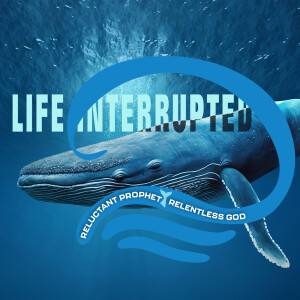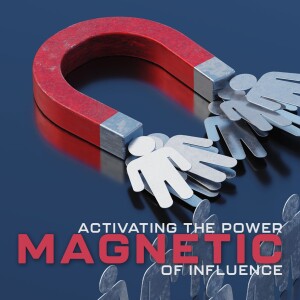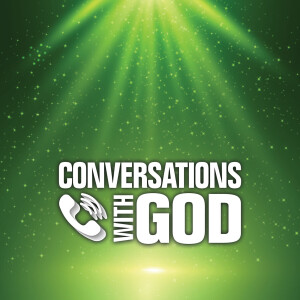Episodes

Tuesday Jul 11, 2023
Life Interrupted | Part 1 | Love Beyond Borders | Michelle Snook
Tuesday Jul 11, 2023
Tuesday Jul 11, 2023
Love Beyond BordersLife Interrupted: Reluctant Prophet, Relentless GodJuly 9, 2023
Summer is in full swing in our part of the world, and for a lot of people that means getting out on the water. Whether it’s a lake, river, or even the ocean, many of us enjoy escaping the cares of life to enjoy some splashing in the sun.
So it seems like a great time to do a sermon series that includes a whale of a tale! For the next four weeks, we’ll be taking a look at the short, Old Testament book of Jonah. And while it’s the big fish that swallows up both Jonah and our attention, it’s really not the most outrageous part of the story. As we will see, as we unpack this unbelievable but true fish story, there’s something far more outrageous going on!
I invite you to join us for Life Interrupted: Reluctant Prophet, Relentless God. What could be more unbelievable than a story about a man being swallowed by a fish and living to tell about it? You’ll just have to join us to find out!
-----------------------------------
TAKE YOUR NEXT STEP
----------------------------------
Give Online: https://www.simplechurchgiving.net/App/Giving/dsf
Message Notes: https://www.dayspringfellowship.com/sermons
Like, comment & subscribe to stay updated!
Instagram: https://www.instagram.com/dayspringkeizer
Facebook: https://www.facebook.com/DayspringKeizer
YouTube: https://www.youtube.com/dayspringfellowship
Website: http://dsf.church
#dayspringkeizer #dayspringfellowship #2023sermon
___________________
Thanks for listening to Dayspring Fellowship's worship service! At Dayspring Fellowship, we believe there is nothing more important than your spiritual growth.

Sunday Jul 02, 2023
Magnetic | Part 4 | Stories to Tell | Chris Voigt
Sunday Jul 02, 2023
Sunday Jul 02, 2023
Over the past few weeks, we’ve been in a series we’ve called Magnetic: Activating the Power of Influence. We’ve been unpacking some of our pre-conceived ideas about what it means to share our belief in Jesus with other people. And we’ve come to understand that there are ways we can do that, that don’t have to be scary or intimidating. This week, as we wrap up, we’ll be taking a look at the power of sharing our stories.
Of all the books I’ve read, the movies I’ve watched, of all the stories I’ve heard... my absolute favorites are the ones that communicate the truth of the power of Jesus to change a heart and redeem a life. Those are the greatest stories ever told. Let’s learn to share those stories with others!
-----------------------------------
TAKE YOUR NEXT STEP
----------------------------------
Let us know that you were watching with us and you will be entered to receive a free prize by completing our Connection Card: http://dsf.church/ecard
Give Online: https://www.simplechurchgiving.net/App/Giving/dsf
Message Notes: https://www.dayspringfellowship.com/sermons
Like, comment & subscribe to stay updated!
Instagram: https://www.instagram.com/dayspringkeizer
Facebook: https://www.facebook.com/DayspringKeizer
YouTube: https://www.youtube.com/dayspringfellowship
Website: http://dsf.church
#dayspringkeizer #dayspringfellowship #2023sermon
___________________
Thanks for watching Dayspring Fellowship's worship service! At Dayspring Fellowship, we believe there is nothing more important than your spiritual growth.

Wednesday Jun 28, 2023
Magnetic | Part 3 | Question Everything | Chris Voigt
Wednesday Jun 28, 2023
Wednesday Jun 28, 2023
Question EverythingMagnetic: Activating the Power of InfluenceJune 25, 2023
We are in week 3 of our series, Magnetic: Activating the Power of Influence. Over the past couple of weeks, we’ve been reframing some of our ideas about evangelism – what it is and how we do it. And we’re learning that it doesn’t have to be scary or intimidating and that we don’t have to know all the answers. This week, we’re going to unpack the principles of asking good questions.
Being curious and asking questions can be powerful tools in our efforts to sow seeds into the lives of others. We all know how good it feels to be asked a genuine question from someone who truly wants to understand.
-----------------------------------
TAKE YOUR NEXT STEP
----------------------------------
Give Online: https://www.simplechurchgiving.net/App/Giving/dsf
Message Notes: https://www.dayspringfellowship.com/sermons
Like, comment & subscribe to stay updated!
Instagram: https://www.instagram.com/dayspringkeizer
Facebook: https://www.facebook.com/DayspringKeizer
YouTube: https://www.youtube.com/dayspringfellowship
Website: http://dsf.church
#dayspringkeizer #dayspringfellowship #2023sermon
___________________
Thanks for listening to Dayspring Fellowship's worship service! At Dayspring Fellowship, we believe there is nothing more important than your spiritual growth.

Wednesday Jun 21, 2023
Magnetic | Part 2 | Flip the Script | Chris Voigt
Wednesday Jun 21, 2023
Wednesday Jun 21, 2023
Flip The ScriptMagnetic: Activating the Power of InfluenceJune 18, 2023
This week, we’re going to look at strategies for effective seed planting. Not the vegetable garden kind of seeds, but the kind of seeds that help produce faith and life-change in the lives of the people around us.
It doesn’t matter if you’re an avid gardener or have the kind of skills that could kill a cactus; if you are a follower of Jesus, you have been entrusted with the most incredible seed and given a mandate to sow, scatter, and plant wherever you go. And trust me on this... once you learn how, you will love it! I can’t wait to share with you this Sunday!
-------------------------
Give Online: https://www.simplechurchgiving.net/App/Giving/dsf
Message Notes: https://www.dayspringfellowship.com/sermons
Like, comment & subscribe to stay updated!
Instagram: https://www.instagram.com/dayspringkeizer
Facebook: https://www.facebook.com/DayspringKeizer
https://www.youtube.com/dayspringfellowship
Website: http://dsf.church

Wednesday Jun 14, 2023
Magnetic | Part 1 | The Myths of Evangelism | Chris Voigt
Wednesday Jun 14, 2023
Wednesday Jun 14, 2023
The Myths of EvangelismMagnetic: Activating the Power of InfluenceJune 11, 2023
We hear the word ‘influencer’ thrown around a lot in our culture these days. It’s like a new category of popularity or famous-ness. There are people who are well-known for being politicians, musicians, artists, authors, and.... influencers. We all know what those other categories are, but what does it mean to be an ‘influencer’?
We are launching a new series this Sunday that we’re calling Magnetic: Activating the Power of Influence. The truth is, all of us are influencers. We all talk about the things we love because we want to share them with others. It might be a great new restaurant or an amazing vacation spot or a fantastic book or an awesome new song or a fun new game. We all share the things we love with the people around us. And we do it naturally, casually, conversationally.
I invite you to join us this Sunday as we begin to unpack what it could look like to influence the people in our world for Jesus.
-----------------------------------
TAKE YOUR NEXT STEP
----------------------------------
Give Online: https://www.simplechurchgiving.net/App/Giving/dsf
Message Notes: https://www.dayspringfellowship.com/sermons
Like, comment & subscribe to stay updated!
Instagram: https://www.instagram.com/dayspringkeizer
Facebook: https://www.facebook.com/DayspringKeizer
YouTube: https://www.youtube.com/dayspringfellowship
Website: http://dsf.church
#dayspringkeizer #dayspringfellowship #2023sermon
___________________
Thanks for listening to Dayspring Fellowship's worship service! At Dayspring Fellowship, we believe there is nothing more important than your spiritual growth.

Wednesday Jun 07, 2023
Conversations With God | Part 4 | The PRACTICE of Prayer | Chris Voigt
Wednesday Jun 07, 2023
Wednesday Jun 07, 2023
The Practice of PrayerConversations With GodJune 4, 2023
This Sunday we are wrapping up our series, Conversations With God. Over the past few weeks, we’ve been taking a look at the topic of prayer. We’ve unpacked some of our problems with prayer, and discovered fresh insights about the purpose and power of prayer. This week, we’re diving into the practice of prayer.
I know... practice doesn’t exactly sound fun. But it’s all about the expectations you attach to it. Playing piano wouldn’t be fun for me if I had to practice in order to play like Beethoven or Billy Joel (well, it might be kinda cool to play like Billy Joel!). But God has wired me to express the uniqueness of who I am through piano in my own way. I practice in the way that fits who He’s made me to be. And He’s invited me... and you... to do the same thing in prayer. Yes, there are certain things we need to get right, but my prayer life isn’t like anyone else’s. It’s my own personal, individual connection with God. And He’s longing to have the same connection with you.
-----------------------------------
TAKE YOUR NEXT STEP
----------------------------------
Give Online: https://www.simplechurchgiving.net/App/Giving/dsf
Message Notes: https://www.dayspringfellowship.com/sermons
Like, comment & subscribe to stay updated!
Instagram: https://www.instagram.com/dayspringkeizer
Facebook: https://www.facebook.com/DayspringKeizer
YouTube: https://www.youtube.com/dayspringfellowship
Website: http://dsf.church
#dayspringkeizer #dayspringfellowship #2023sermon
___________________
Thanks for listening to Dayspring Fellowship's worship service! At Dayspring Fellowship, we believe there is nothing more important than your spiritual growth.

Wednesday May 31, 2023
Conversations With God | Part 3 | The POWER of Prayer | Chris Voigt
Wednesday May 31, 2023
Wednesday May 31, 2023
The Power of PrayerConversations With GodMay 28, 2023
We are in week three of a four-part series we’ve called, Conversations With God. Over the past couple of weeks, we’ve unpacked the problem and the purpose of prayer. This week, we’re turning our attention to another aspect: the power of prayer. The Old Testament prophet Isaiah, writing to the people of Israel, penned these words from the LORD, “In repentance and rest you will be saved, in quietness and trust is your strength. But you were not willing...” And the psalmist writes, “Be still, and know that I am God.”
It’s so counterintuitive to us. We are go-getters, the git-er-done-ers. From the time we’re old enough to utter the words, “I do it myself!” we are fiercely independent. It’s almost a badge of honor! But God coaxes and nudges us a different direction. Toward connection, relationship, dependency on Him. And it’s in that connection, communion, and conversation with Him that we find that the unlimited power of God is more than enough to meet our every need. Because there are some things we can’t DIY and even more that would be better if we didn’t try!
-----------------------------------
TAKE YOUR NEXT STEP
----------------------------------
Give Online: https://www.simplechurchgiving.net/App/Giving/dsf
Message Notes: https://www.dayspringfellowship.com/sermons
Like, comment & subscribe to stay updated!
Instagram: https://www.instagram.com/dayspringkeizer
Facebook: https://www.facebook.com/DayspringKeizer
YouTube: https://www.youtube.com/dayspringfellowship
Website: http://dsf.church
#dayspringkeizer #dayspringfellowship #2023sermon
___________________
Thanks for listening to Dayspring Fellowship's worship service! At Dayspring Fellowship, we believe there is nothing more important than your spiritual growth.

Wednesday May 24, 2023
Conversations With God | Part 2 | The PURPOSE of Prayer | Chris Voigt
Wednesday May 24, 2023
Wednesday May 24, 2023
The Purpose of PrayerConversations With GodMay 21, 2023
I invite you to join us this Sunday as we continue our series Conversations With God. We’re focusing on the topic of prayer; this week more specifically, on the purpose of prayer. I think a lot of people might say that the purpose of praying is to ask for divine help with something too big for them to handle on their own or to get something they want or need. But that perspective reduces God to some sort of cosmic vending machine. As we will discover, there’s a much deeper, and perhaps surprising, purpose for prayer. And it has everything to do with friendship.
-----------------------------------
TAKE YOUR NEXT STEP
----------------------------------
Give Online: https://www.simplechurchgiving.net/App/Giving/dsf
Message Notes: https://www.dayspringfellowship.com/sermons
Like, comment & subscribe to stay updated!
Instagram: https://www.instagram.com/dayspringkeizer
Facebook: https://www.facebook.com/DayspringKeizer
YouTube: https://www.youtube.com/dayspringfellowship
Website: http://dsf.church
#dayspringkeizer #dayspringfellowship #2023sermon
___________________
Thanks for listening to Dayspring Fellowship's worship service! At Dayspring Fellowship, we believe there is nothing more important than your spiritual growth.

Wednesday May 17, 2023
Conversations With God | Part 1 | The PROBLEM With Prayer | Chris Voigt
Wednesday May 17, 2023
Wednesday May 17, 2023
The Problem With PrayerConversations With GodMay 14, 2023
Join us this Sunday as we begin a new sermon series we’re calling, Conversations With God. We’ll be taking a look at the topic of prayer. When it comes to praying, a lot of people have more questions than answers. We wrestle with things like, “What should I pray for? What words do I say? Is God even listening? What if He doesn’t answer? Where do I even start?” And because it can feel confusing or intimidating or even pointless, because – let’s face it – God doesn’t exactly talk back to us the way our friends do – we give up and spend more of our time wishing instead of praying. Over the next four weeks we’ll unpack some principles for developing a powerful prayer life.
-----------------------------------
TAKE YOUR NEXT STEP
----------------------------------
Give Online: https://www.simplechurchgiving.net/App/Giving/dsf
Message Notes: https://www.dayspringfellowship.com/sermons
Like, comment & subscribe to stay updated!
Instagram: https://www.instagram.com/dayspringkeizer
Facebook: https://www.facebook.com/DayspringKeizer
YouTube: https://www.youtube.com/dayspringfellowship
Website: http://dsf.church
#dayspringkeizer #dayspringfellowship #2023sermon
___________________
Thanks for listening to Dayspring Fellowship's worship service! At Dayspring Fellowship, we believe there is nothing more important than your spiritual growth.

Wednesday May 10, 2023
What Happy Couples Know | Part 4 | It’s a Choice | Chris Voigt
Wednesday May 10, 2023
Wednesday May 10, 2023
It's A ChoiceWhat Happy Couples KnowMay 7, 2023
We are wrapping up our series, What Happy Couples Know this weekend. Over the past three weeks, we’ve unpacking principles for developing and nurturing healthy marriages, But the principles we’ve learned can be help us thrive in every relationship! In this final week of our series, we’ll discover that happy couples know they have a choice.
In the classic scene from Indiana Jones and the Last Crusade, the Grail Knight cautions Indy as he stands before an array of chalices. “Choose wisely, for while the true Grail will bring you life, the false Grail will take it from you.” The choices we make in life, and in our relationships will make the difference between thriving or surviving, between life or death.
-----------------------------------
TAKE YOUR NEXT STEP
----------------------------------
Give Online: https://www.simplechurchgiving.net/App/Giving/dsf
Message Notes: https://www.dayspringfellowship.com/sermons
Like, comment & subscribe to stay updated!
Instagram: https://www.instagram.com/dayspringkeizer
Facebook: https://www.facebook.com/DayspringKeizer
YouTube: https://www.youtube.com/dayspringfellowship
Website: http://dsf.church
#dayspringkeizer #dayspringfellowship #2023sermon
___________________
Thanks for listening to Dayspring Fellowship's worship service! At Dayspring Fellowship, we believe there is nothing more important than your spiritual growth.




